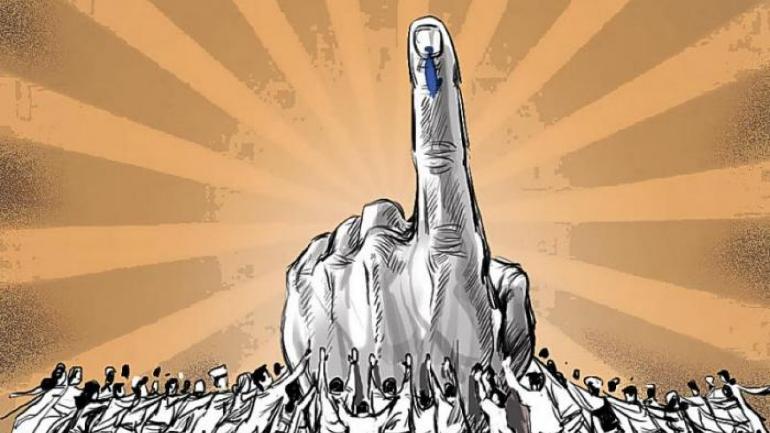For your vote to matter in an election, the election would have to be an equal split between two candidates, where you walk into the polling booth and decide the outcome. The likelihood of that happening is infinitesimal. Add to that the widespread ignorance among voters about party manifestos, the standing representatives and the workings of the political system. Even if you spend time every day informing yourself about politics, it’s your informed vote lost in a sea of ignorance. Why bother?
Each election season, there are vociferous debates between intellectuals trying to prove voting behaviour irrational and those attempting to bring out the rationality in it. My interest in this peaked when I ended up leaving an office offsite conducted in Himachal Pradesh midway, boarded an overnight train, just to cast my ballot in Noida. Everyone in the know about my plan tried to reason with me by saying: ‘Why would you spend so much money and effort trying to contribute to a cause whose outcome won’t be affected by your actions, in the least? In fact, you wouldn’t be affected by the result either! So, why don’t you rather attend the offsite and reap some tangible benefits through the training?’ Their reasoning had merit, and it wasn’t the first time I heard this chain of arguments. Rational Choice Theory is all about the irrationality of voting as a means of bringing about an outcome desired by an individual voter, and the rationality of not voting.
What astounds me is that, despite this, why do so many individuals bear the cost of casting their ballot each election? Many theorists have tried to explain this. Richard Tuck, in Free Riding, makes a case for the ability of a vote to affect the outcome in certain scenarios and therefore argues that voting is in such cases a rational act. I won’t get into the details of Tuck’s arguments as he doesn’t prove the rationality of all votes, so we still cannot convincingly say that voters vote because it is rational to do so. Geoffrey Brennan and Loren E. Lomasky explained this phenomenon through their Expressive Theory of Voting which argues that people vote to ‘express a desire’. It could be a desire to vote as a civic duty, for a policy, a party or a candidate of their preference. They don’t care about the instrumentality of their vote as much as expressing their preferences via their ballot. The analogy they use is of a fan cheering for their favourite football team. It’s inconsequential, but it makes the fan feel like they are doing their bit.
This theory, however, doesn’t resonate well with me. If I had to express a desire for something, wouldn’t I rather run a social media campaign, initiate a rally, roam around wearing a slogan t-shirt, or participate in discussions about the same, instead of waiting in a queue on a hot day only to express my desire behind a booth, with no one to acknowledge it? To use an example given by Gerry Mackie, from University of California San Diego, if I wished to express this desire only to myself, I would have written it on my bathroom mirror and read it every day while brushing my teeth.
If people do not vote for expressive reasons, why do they vote? A possible explanation can be that the argument of homo economicus does not hold true for voting behaviour – i.e. people do not vote out of self-interest but rather do so in the interest of many. This interest could be voting for the needs of their immediate community or for the value systems they identify with. Despite the individual benefit derived from the act being little, the larger collective benefit can push people to bear the cost of participating in the democratic apparatus.
While this explains why people would bear the cost of voting, it’s still unclear why they would vote cognisant that it won’t affect the outcome at all. Mackie in his paper ‘An Examination of the Expressive Theory of Voting’ argues for a contributory theory of voting, using the analogy of a basketball team playing to win the match with the greatest margin of scores or losing by the least margin. Voting is just the same. We vote because we want the policies, parties or candidates favoured by us to win by the greatest margin of votes or to lose by the least margin, and this is what confirms our vote’s instrumentality.
Some opine that the cost of finding out about all the candidates – their personal and party manifestos, their track record and other crucial information which would be pivotal in making an informed choice, is so high that people would rather vote with ignorance or not vote at all. While political ignorance is an unfortunate reality we need to remedy, we still cannot call voting irrational. At least not till we stop calling individuals’ market decisions rational.
Individuals don’t carry out intense market research before buying any product or making investments. They conduct just enough research to be convinced that they know what they are doing. For a market choice, people argue that a bad choice can be corrected by not making the same exchange in the future. I am surprised they can’t see that ballot choice works similarly. When individuals vote, they feel they know enough to take a decision, and if the decision doesn’t turn out favourably, in the next elections they change their allegiance. Public choice theorists rightly argue that we must observe the same standards while analyzing private and public action, after all, it is the same human being functioning in both. I suggest we extend the same principle to market and voting behaviour – if market behaviour is considered rational, despite its apparent flaws, then voting behaviour should be too.
Read more: https://spontaneousorder.in/is-compulsory-voting-democratic/
Post Disclaimer
The opinions expressed in this essay are those of the authors. They do not purport to reflect the opinions or views of CCS.






